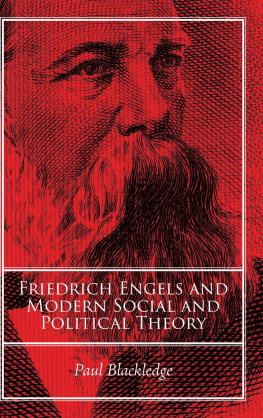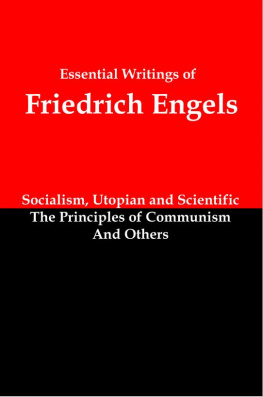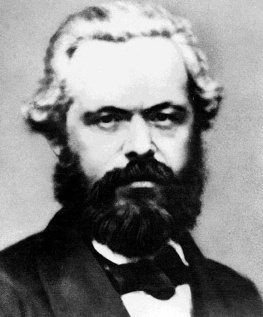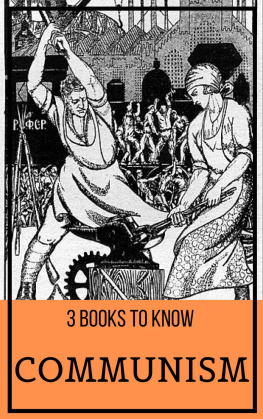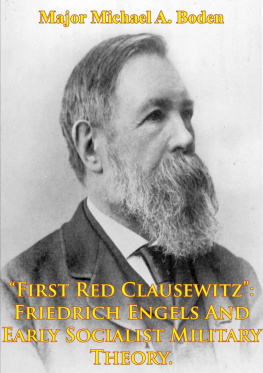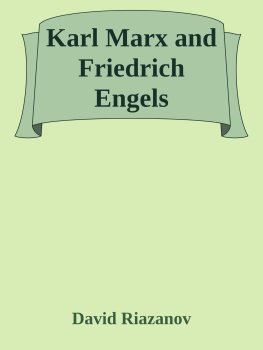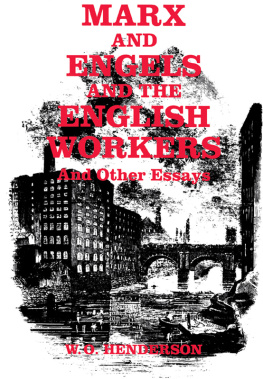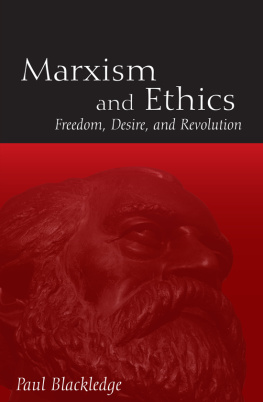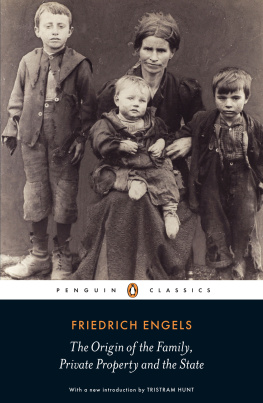F RIEDRICH E NGELS AND
M ODERN S OCIAL AND
P OLITICAL T HEORY
F RIEDRICH E NGELS AND
M ODERN S OCIAL AND
P OLITICAL T HEORY
Paul Blackledge
Published by State University of New York Press, Albany
2019 State University of New York
All rights reserved
Printed in the United States of America
No part of this book may be used or reproduced in any manner whatsoever without written permission. No part of this book may be stored in a retrieval system or transmitted in any form or by any means including electronic, electrostatic, magnetic tape, mechanical, photocopying, recording, or otherwise without the prior permission in writing of the publisher.
For information, contact State University of New York Press, Albany, NY
www.sunypress.edu
Library of Congress Cataloging-in-Publication Data
Names: Blackledge, Paul, 1967 author.
Title: Friedrich Engels and modern social and political theory / Paul Blackledge.
Description: Albany : State University of New York Press, 2019. | Includes bibliographical references and index.
Identifiers: LCCN 2018059663 | ISBN 9781438476872 (hardcover : alk. paper) | ISBN 9781438476896 (ebook)
Subjects: LCSH: Engels, Friedrich, 18201895. | Social history19th century. | SocialismHistory19th century. | CommunismHistory19th century. | Political sciencePhilosophyHistory19th century.
Classification: LCC HX276.E6 B55 2019 | DDC 300.1dc23
LC record available at https://lccn.loc.gov/2018059663
10 9 8 7 6 5 4 3 2 1
To Kristyn, Johnny, Matthew, Kate, and Jack, with love
Contents
Acknowledgments
S ome of the arguments presented in this book were first rehearsed in articles published in the journals Critique , Science and Society , Socialism and Democracy , Social Theory and Practice , and War and Society and in the edited collections The Oxford Handbook on Karl Marx and Marx and Contemporary Critical Theory: The Philosophy of Real Abstraction . Thanks to the editors and referees of these publications for forcing me to sharpen up my ideas. Thanks also to the numerous others who have helped along the way. These include Sue Abbott, Jeff Abrams, Simone Abram, Yunus Bakhsh, Colin Barker, Ron Beadle, Lori Beckett, Andrius Bielskis, Sue Birch, Ian Birchall, Vicky Blake, Ann Blair, Tim Briggs, Geoff Brown, Adrian Budd, Tony Burns, Phil Cardew, Janet Carr, Tony Collins, Catherine Connolly, Suzanne Corazzi, Nick Cox, Jon Dart, John Davies, Jonathan Davies, Jennifer Dods, Pete Dwyer, Sandra Falshaw, Ziyun Fan, Anne Foley, Dana Foote, John Bellamy Foster, John Green, Robert Hayes, Christian Hgsbjerg, Oriel Kenny, Mumtaz Khan, Farzad Khosrowshahi, Sarah Kingston, Kelvin Knight, Buket Korkut Raptis, Eleni Leontsini, Anna Liddle, George Lodorfos, Jonathan Long, Lesley McGorrigan, James McGrath, Jo McNeill, Hugh Meyer, Richard Miles, Joanna Moncrief, Carlo Morelli, Ryan Morris, Bob Mouncer, Jeff Nicholas, Brendon Nichols, Jane Nolan, Mark Oley, Dorron Otter, Annemarie Piso, Michael Rinella, Ruth Robbins, Jeannie Robinson, Stephen Robson, Helen Rodgers, Ted Sarmiento, Sean Sayers, Darren Shaw, Sue Sherwin, Alan Smith, Karl Spraklen, Jacqueline Stephenson, Louisa Tamplin, Dan Taylor, Lisa Taylor, Briony Thomas, Terry Thomas, Vikki Tommy-Knight, Lee Tucker, Lise Vogel, Jennifer Walker, Jayne-Louise Watkins, Colin Webster, Phil Webster and Terry Wrigley. Finally, my wife and children continue to inspire me. This book is dedicated to them.
Introduction
Marx, Engels, Marxism
A s we approach the bicentenary of his birth, Friedrich Engelss reputation as an original thinker is, among Anglophone academics at least, at its nadir. The main reason for this unfortunate state of affairs is undoubtedly political. Despite the recent global economic crisis and associated increases in inequality that have tended to confirm Marx and Engelss general critique of capitalism, Marxism is an optimistic doctrine that has not fared well in a context dominated by working-class retreat and demoralization (Barker, et al. 2013, 5, 14, 25). But if this context has been unpropitious for Marxism generally, criticisms of Engelss thought have a second, quite separate, source. Over the course of the twentieth century, a growing number of commentators have claimed that Engels fundamentally distorted Marxs thought, and that Marxism and especially Stalinism emerged out of this one-sided caricature of Marxs ideas (Levine 1975, xv; xvii; Bender 1975, 152; Carver 1981, 1983, 1989; Claeys 2018, 219228; Jordan 1967, 332333; Liedman 2018, 497; Rockmore 2018, 73; Sperber 2013, 549553; Stedman Jones 2016, 556568; Thomas 2008, 3549; Tucker 1961, 184; Walicki 1995, 121).
While the claim that Engels distorted Marxs ideas has roots going back to the nineteenth century (Rigby 1992, 4), 1956 was a pivotal moment after which it increasingly became a dominant theme within the secondary literature (Rees 1994). When a New Left emerged in response to Khrushchevs Secret Speech, the Russian invasion of Hungary, and the Anglo-French-Israeli invasion of Egypt, it attempted to renew socialism through a critical reassessment of Marxism. Engelss contribution to Marxism became a focal point in the ensuing debate. Though a small minority among this milieu attempted to rescue Engelss and Lenins reputations alongside that of Marx from any association with Stalins counterrevolution, a much larger group concluded that the experience of Stalinism damned the entire Marxist tradition all the way back to Marx. Between these two poles, a third grouping counterposed Marxs youthful humanistic writings to Engelss scientific interpretation of Marxism (Blackledge 2014b).
Drawing on a one-sided interpretation of Georg Lukcss early critical comments on Engelss concept of a dialectics of nature, this milieu gravitated to the view that Engels was Marxs greatest mistake. Thus, by 1961, George Lichtheim could take it for granted that whereas Marx had sought to transcend the opposition between idealism (autonomous morality) and materialism (heteronymous causation) through his concept of praxis, Engels had reduced Marxism to a positivistic form of materialism (Lichtheim 1964, 234243). A few years later Donald Clark Hodges essentially endorsed the view among academics that the young Marx has become the hero of Marx scholarship and the late Engels its villain (Hodges 1965, 297). Similarly, in 1968, Alasdair MacIntyre wrote of, and rejected, Engelsian Marxism for its apparent conception of revolution as a quasi-natural event. Engels, according to this critique, believed that we must await the coming of the revolution as we await the coming of an eclipse (MacIntyre 1995, 95).
In what is probably the most uncharitable critique of Engelss thought, Norman Levine argues that while it is true that Marxism gave rise to Stalinism, twentieth-century Marxism is best understood as a form of Engelsism, a bastardization of Marxs original ideas in which his sublation of idealism and materialism was reduced to a positivist, mechanical, and fatalistic caricature of the real thing. There was, according to Levine, a clear and steady evolution from Engels to Lenin to Stalin, and Stalin carried this tradition of Engels and the Engelsian side of Lenin to its extreme (Levine 1975, xvxvi).
The rational core of the claim that Engels begat Marxism derives from the fact that Engels penned the most influential popularization of his and Marxs ideas: the ironically titled Herr Eugen Dhrings Revolution in Science . Universally known as Anti-Dhring , this book played a key part in winning the leadership of the German Social Democratic Party (SPD) to Marxism during the period of Bismarcks antisocialist laws (Mayer 1936, 224; Adamiak 1974). Anti-Dhring is also Engelss most controversial work. This is in large part because, as Hal Draper has pointed out, it is the only more or less systematic presentation of Marxism written by either Marx or Engels. Consequently, anyone wanting to reinterpret Marxs thought must first detach this book from his seal of approval (Draper 1977, 24). It is thus around Anti-Dhring , the shorter except from it, Socialism: Utopian and Scientific , and other related works, most notably Ludwig Feuerbach and the End of Classical German Philosophy and the unfinished and unpublished in his lifetime Dialectics of Nature , that debates about the relationship of Marx to Engelsian Marxism tend to turn.


